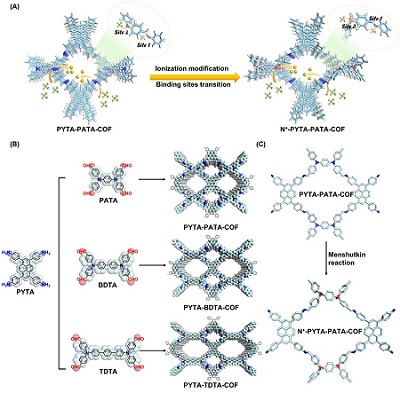Research Progress
Adsorbents with high capture efficiency and capacity are crucial in precious metal resource recovery. Covalent organic frameworks (COFs), a class of crystalline porous organic materials, are regarded as ideal templates for ions adsorption due to their elaborate designability and modifiability.
However, most reported COFs have been focused on constructing hydrogen bond interactions inside frameworks to improve the adsorption capacity and gold selectivity, while the effects of intrinsic frameworks on gold capture are unproved.
Recently, a research team led by Prof. ZENG Gaofeng and Associate Prof. XU Qing at the Shanghai Advanced Research Institute (SARI), collaborated with Prof. HAN Baohang and Associate Prof. DING Xuesong at Nanoscience National Center for Nanoscience and Technology, developed a skeleton engineering of COFs for high-efficiency absorbs towards gold capture.
The results were published in Angew. Chem. Int. Ed.
Researchers first construct three electron-neutral COFs with diarylamine derivatives. Then, they use the Menshutkin reaction to synthesis ionic COFs containing ionic skeleton which can enhance the column force between Au ions and frameworks.
The adsorption performance is further improved by introducing an ionized skeleton. The ionic COFs exhibit the adsorption capacity of 1834 mg g-1 and reached 90% of the maximum adsorption within 10 mins with good cyclic stability.
The theoretical calculation shows that the transition of binding site from imine bond to ionic nitrogen after the post modification, which helps to enhance coulomb force with gold ions, further improving the adsorption kinetics.

Skeleton engineering was adopted to form COFs with diarylamine derivatives and ionized skeletons (Imaged by SARI)
Contact: ZENG Gaofeng
Shanghai Advanced Research Institute
Email:zenggf@sari.ac.cn





